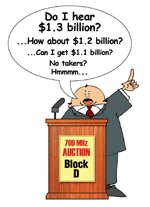Driving around in my car just before Easter with the radio tuned to National Public Radio, I first heard the news: the FCC successfully sold the 700-MHz spectrum in a record-breaking $19.2 billion auction. The big winners: telecoms AT&T and Verizon, who went after the spectrum’s coveted Block C.
I moved closer to the radio (an instinctive move even though the sound doesn’t come from there) as the discussion turned to Block D, the 10-MHz band set aside for public safety. In the wake of disasters like the World Trade Center destruction and Hurricane Katrina, I though this was the most important part of the auction.
It turned out, however, that no company wanted Block D, which couldn’t even get the $1.3 billion reserve price, while all the other sections (A, B, C, and E) sold at either the reserve price or better. Why? How could this happen?

Maybe Block D was priced too high. According to published reports, Qualcomm was the only bidder, offering $472 million. Shortly afterward, however, came the allegations.
Following the auction, the Media Access Project filed a request with FCC Chairman Kevin Martin to investigate “whether discussions between Morgan O’Brien of Cyren Call and possible Block D bidder Frontline Wireless caused Frontline to lose financial backing and scared off other bidders.”
Let’s back up a bit. Block D was being sold as a public-private partnership, and the Public Safety Spectrum Trust (PSST) organization was charged with representing the public’s interest. Cyren Call, headed by O’Brien, is the PSST’s adviser.
The FCC needs to lower the Block D band reserve price and put the spectrum back up for auction as soon as possible.
Basically, the allegations are that Cyren Call extorted would-be bidders with conditions such as a 10-year $50 million-per-year access fee, and that O’Brien would be the go-between to the public safety community as well as for any spectrum resale.
Cyren Call and the PSST refute the allegations, of course, and stated, “Whatever caused Frontline to abandon its pursuit of the D Block occurred after it . . . had endorsed both the PSST’s partnership expectations and the FCC’s reserve price.”
In any case, the FCC will not be putting Block D back on the auction block immediately, which I think is a big mistake. It is waiting to “consider all the options.”
Hopefully, one of those options is not stripping the mandate to use the spectrum for emergency communications: this is vital. What should happen is that the spectrum’s reserve price is lowered to a fair market value, and the Block D is put up for auction soon, even if that means removing some of the players from the mix.
Ralph Raiola
Advertisement
Learn more about Electronic Products Magazine





